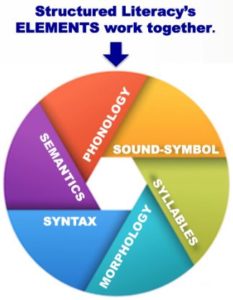Continuing Education
Are you interested in taking the next step in helping struggling readers? Do you want to learn how to improve your skills as a Teacher of Reading? Do you want to learn more about how to provide appropriate reading intervention to a child with dyslexia? We welcome you to explore below and feel free to reach out to us for more guidance at info@orbida.org.
The National Assessment of Educational Progress (NAEP) consistently finds that ONLY 36% of fourth-grade perform at or above the Proficient level in reading. In other words, 64% of our nations students are reading below proficiency level. Research has demonstrated that most reading difficulties can be resolved or diminished when reading is taught by a highly knowledgeable and skilled teacher.
IDA views (1) PROGRAM ACCREDITATION and (2) TEACHER CERTIFICATION as critical elements to change the way reading is taught in classrooms across America. Program Accreditation and Teacher Certification can positively impact student reading outcomes by promoting standards that reflect the Knowledge and Practice Standards for Teachers of Reading.
There is training for individuals, pre-service and in-service teachers. In addition, there is whole school and whole district training opportunities. For more information please email info@orbida.org.
(1) PROGRAM ACCREDITATION
Accreditation is a “seal of approval” that assures the public that your organization’s educator training curriculum and practicum experiences are aligned with the Knowledge and Practice Standards for Teachers of Reading (KPS) sufficient to ensure that program completers are knowledgeable about, and can apply, the principles and practices of Structured Literacy in the service of preventing reading failure and re-mediating off-track readers with profile characteristic of dyslexia.
The International Dyslexia Association has refined the Knowledge and Practice Standards (KPS) to bring greater specificity to how knowledge of the standards could be assessed in the context of coursework and how practice applications of Structured Literacy could be demonstrated in supervised practicum contexts. The KPS define the knowledge and skills that all teachers of reading should possess to teach all students to read proficiently. To view the Knowledge and Practice Standards please visit the IDA website…click here
For a list of Accredited Programs in your area, please visit the links below:
University Programs Accredited by IDA
Independent Teacher Training Programs Accredited by IDA
(2) TEACHER CERTIFICATION
CERI certifications are designed for general education professionals interested in preventing reading failure and advancing off-track readers and for those professionals who provide targeted, remedial reading interventions to readers with profiles characteristic of, or readers identified with, Dyslexia.
Professionals graduating from an IDA Accredited Program are prepared to earn a CERI certification.
These certificates and certifications include:
- Structured Literacy Classroom Teacher Knowledge Certificate
- Structured Literacy/Dyslexia Interventionist
- Structured Literacy/Dyslexia Specialist Practitioner or Therapist
To Learn More About Certification please visit the CERI website…click here
Knowledge & Practice Standards – MORE INFO
The Knowledge & Practice Standards (KPS) define the knowledge and skills that all teachers of reading should possess in to teach all students to read proficiently. To view the Knowledge and Practice Standards, click here.
Please watch video for more information
Structured Literacy – MORE INFO
Structured Literacy is an approach to reading instruction that is beneficial for both general education students at risk for reading difficulties due to a variety of factors (e.g. low socio-economic status, status as an English learner) and for students with disabilities. This approach is characterized by the provision of systematic, explicit instruction that integrates listening, speaking, reading and writing and emphasizes the structure of language across the speech sound system (phonology), the writing system (orthography), the structure of sentences (syntax), the meaningful parts of words (morphology), the relationships among words (semantics), and the organization of spoken and written discourse.
For more information please click here



